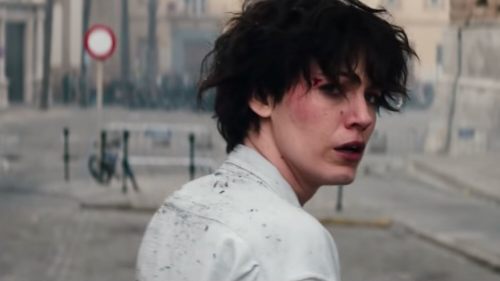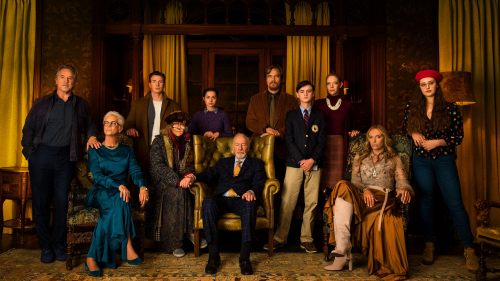Fantastic Fest Review: ANTIVIRAL Is A Cronenberg Film
How do we talk about Brandon Cronenberg's Antiviral without making the conversation all about his father? The young director, making his feature debut here, would like us to; I wish I could. But from the sterile dystopia it presents to its use of disease and physical transformation as metaphor, there's no escaping the fact that Antiviral has David Cronenberg's DNA stuffed into every nook and cranny, and the film often feels like an extension of the veteran director's earlier, chillier work.

Syd March (Caleb Landry Jones) works for The Lucas Clinic as a broker of designer viruses in an alternate world (NOT a futuristic one; the year is established as 2011) in which celebrity obsession has progressed and metastasized into something horrifying yet familiar. The Paris Hiltons and Kim Kardashians of this world don't release albums, or movies or any discernible content. They work with firms like Syd's to release to the public the cold they caught in Europe, or the flu they caught in Africa, et al. These bugs are taken from the celeb, copy-protected by guys like Syd to keep them from being communicable, and sold to the star's fanbase. The film's narrative thrust comes via Syd's two secrets: he's got a pirate home system in which he cracks the viruses' copyright encryption so he can sell them to the black market, and lately Syd's been getting high on his own supply.
There's a lot to love in this film: the satire of celebrity culture is dead-on and hilarious. Poking fun at the Paris Hiltons of the world is often fish-in-a-barrel territory, but Cronenberg knocks this stuff out of the park. The news reports nothing but celebrity goings-on, or sometimes the opposite of celebrity goings-on: we get a glimpse at a half-animated story about one hot celeb's colon. The news seems to be that she has a colon. At no time are we ever told why these individuals are famous, only that "everyone who is famous deserves to be famous." Employees at the virus clinic gossip about which of the celebrities (there seem to be only three or four; the culture is FOCUSED) was born without a vulva, or intimate details of their deaths. Butcher shops sell "cell steaks" - organic matter grown in labs from the cells of the famous, served up and eaten in homes and restaurants, eagerly consumed by a public who wants to feel closer and closer to their objects of obsession.
There are some outright lifts from David Cronenberg's CV. Caleb Landry Jones has a Bowie-esque otherness to his performance that serves the tone of the film well, but at the same time recalls Adrian Tripod from Crimes of the Future. That film is also invoked in this film's sterile, colorless production design. The protagonist's black market dealings can be mapped onto Max Renn's journey into the underworld in Videodrome, from the legit businessman's back room operation to a sex club where men interact with video images of the film's three celebrities. Brandon Cronenberg even raids his dad's casts, making effective use of Nicholas Campbell (The Brood, Naked Lunch) as the head of the virus clinic, who makes a few comments right out of Brian O'Blivion's playbook.
It's a cold, distant film, its narrative measured but purposeful, only dragging toward the last third. Not helping matters is Malcolm McDowell turning up late in the game.The film sells you a complete reality, filled with mostly new faces, and McDowell's well-known visage turning up some 90 minutes in deflates that a bit.
The comparison the film draws between its viruses as valuable commodities and digital entertainment in the 21st century is also something fairly on the nose, but executed deftly. It's here where I start to feel for the director because even his sense of humor invites comparisons to his father. At some point we're so steeped in familiar territory that maybe we're simply seeing ghosts of the father.
Which brings us back to Brandon Cronenberg's request. It's either a really disingenuous one, or it indicates a lack of self-awareness that means we have to re-evaluate the entire film. Thematically, aesthetically it's so tied to early David Cronenberg that at some point the film's subtext starts to become more about a son using his dad's paintbrushes. That's probably worth exploring; it's impossible to ignore. Whether Brandon Cronenberg legitimately thinks he made a film that should stand on its own or, more cynically, knew going in what kind of film would put him on the map, is something of which I'm not sure.



